Table of Contents
“Desafinado” by Antonio Carlos Jobim, Newton Mendonça and Jon Hendricks
There has been a healthy dose of Latin songs that have made their way into the Great American Songbook—after all—Central America and South America are every bit as “American” as the United States. Among the composers of Latin jazz standards, the inimitable guitarist/composer, Antonio Carlos Jobim (1927-1994), stands tall. Jobim composed a great many enduring songs that jazz musicians have latched onto as essential Great American Songbook gems.
Newton Mendonça wrote the original Portuguese lyrics, after which the vocalese master, Jon Hendricks (b. 1921), created an English version. The resulting work is an interesting study in both lyrics and music. The Portuguese word “desafinado” essentially means “out of tune,” which justifies Jobim’s pointed use of dissonant intervals and non-diatonic melody notes. The pathway followed by the song explores various tonal centers in search of consonance, and the lyricists beautifully captured this essence.
Best Sheet Music download from our Library.
Form and Melody
The form of this song departs from the common AABA and ABAB, thirty-two bar forms. The eight-bar A theme (measures 1-8) is comprised of two four-bar phrases, each mostly stepwise (walking up a perfect fourth) and shaped like a double arc, ending on the flat 5 of the V/V chord in m. 3 and on the flat 5 of the iii7(b5) chord in m. 7).
A is followed by an eight-bar B theme (mm. 9-16). B can also be divided into two phrases, and begins with a quick interval of an ascending seventh starting on an offbeat, which leads directly into a descending line, first stepwise, then involving leaps that highlight dissonances.
Please, subscribe to our Library.
If you are already a subscriber, please, check our NEW SCORES’ page every month for new sheet music. THANK YOU!
The A theme reappears in the next eight bars (mm. 17-24) before a C theme (reminiscent of B for only the first bar) serves as a transition into a new key a major third higher than tonic (mm. 25-32). A new section begins (D at mm. 33-40) and is melodically characterized by a major second stepping back and forth between scale degrees 5 and 6 in the new key, after which a transposition of the new melody motif (the E theme, up a minor third from the D theme) carries the song to the original dominant (V) to bring the listener back to the A theme in the tonic key.
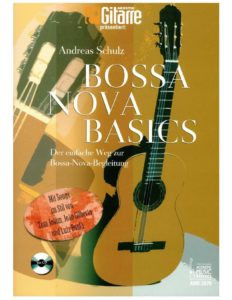
This A statement ends a bit differently, creating an arc of energy at the apex of the second phrase, so it is called A’ (A-prime).
This modification of A is often a very useful songwriting strategy, as it creates interest and variation, bringing the song around to a fresh ending having a touch of new material. This new material begins with a four-bar phrase of descending stepwise melodic sequences (“We’re bound to get in tune again before too long,”) which connect to another eight-bar melodic group characterized by tonal repetition of the tonic pitch.
Jobim utilized a type of cadential extension here, creating a twelve-bar final theme instead of the expected eight. This final twelve bar segment resembles a coda or “tail” built right into the piece (F theme). When one steps back, one can see that Jobim utilized a loose sonata form here—ABAC represents the Exposition, D and E are the Development (a transitional section), A’ clearly represents the Recapitulation (return of A) and the F theme functions as an obvious coda.
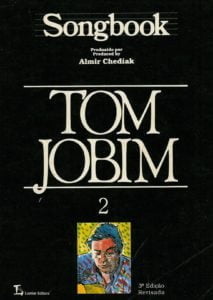
Jobim’s use of motives plays a strong role in this melody’s originality, as does his playing with dissonant tones outside the diatonic scale. Predominant motives include the opening four steps up the diatonic major scale in the very first bar. This melodic and rhythmic motive appears in both forward and retrograde varieties (retrograde in m. 9, with variation at m. 13, then retrograde in sequence with a downward step progression at mm. 57-58). A second motive Jobim employs is the rocking whole step, first cleverly introduced at m. 29 (“like the bossa nova, love should swing.”).
He features this motive in the last four bars of the first major section of the piece, anticipating and announcing the next large section’s primary motive. At mm. 33-48 (the D theme), Jobim combines both motives in an alternating, smoothly flowing pattern, showing his mastery of creating motivic and melodic unity. Hendricks mirrors the more consonant music in this section by using text reminiscent of bygone happy times (“We used to harmonize two souls in perfect time…”).
The motive in the final twelve bars, a repeated tonic pitch, successfully makes the composer’s point of finally attaining concordance (there is nothing more concordant than a unison pitch) following a melody peppered with dissonant leaps and unexpected tonal shifts. Hendricks’ response here reinforces the music with an idealized text depicting two hearts and souls at last abiding in perfect harmony.
Text Setting
As acknowledged above, the lyrics for “Desafinado” were originally in Portuguese, and these are still performed today. Whenever a writer is faced with the challenge of re-setting a text from another language to existing music, there are several important considerations.
First, one must comprehend the difference between a translation and a transliteration. A translation represents the precise meaning of a text in another language. A transliteration merely fits the music into a new language’s pattern of declamation—it may have little or nothing to do with the original text’s meaning.
A competent lyricist will have a full understanding of the original text’s translation before attempting a new transliteration into another language. Some transliterations respect the original text as well as convey the general meaning and theme of the composer’s and lyricist’s intent. Other transliterations seem to start with a clean slate and find alternate ways to convey a composer’s intent (that seems to be the case here with Hendricks’ lyrics).
Either way, tastefully setting the text in a manner that suits the singer and preserves the integrity of both music and lyrics becomes the goal. When studying a word-by-word translation of this original text, one quickly discovers that the Portuguese song’s theme is about a singer feeling hurt by her lover’s disapproval of her out-of-tune singing. She chastises him for not remembering that even those who sing out of tune have fragile hearts.
By contrast, Hendricks’ lyric approach changes the focus of the song to describe two people whose dissonant hearts must be made consonant for love to thrive. Regardless of the version preferred, a comparison of these two very different perspectives lends itself to a deeper understanding of the music and how it can be interpreted. Two lyricists may set the same piece of music using completely different paradigms. In this case, Mendonça spoke from a literal point of view regarding the dissonance expressed in the song title, while Hendricks spoke from a figurative, metaphorical standpoint.
Harmony
Jobim’s initial harmonic move (between the first and second chords of the piece) immediately sets the tone for a theme of dissonance throughout the song. He moves from a casual I chord to a V7(b5)/V—in no way providing smooth harmony or easy voice leading. He then mollifies the harshness by turning that chord into a minor chord over the same root and moves through a ii7-V7 progression which leads to a surprising vi7(b5), reflecting the previous b5 chord. The melody notes here are those dissonant b5s and b9s.
His B theme starts with ii7 and proceeds through a circle of dominant chords, but does not find its way back to the V of tonic before he interjects a dissonant major 7th built on the b9 immediately preceding a turnback progression (V7-I) to return to A. Jobim’s unexpected harmonic shifts effectively create the dissonant tension illuminated in the text. The C theme combines the two motives previously described and shifts the harmony from I to III. Not coincidentally, Hendricks’ lyrics beautifully reflect the harmony at this juncture: “Seems to me you’ve changed the tune we used to sing…”
At the D theme, Jobim utilizes a chromatically ascending bass from I-dim7/ii-ii-V7 followed by a typical I-vi-ii-V7 before modulating up a third and repeating the chromatic ascent (in the new key). He then transforms the V7 chord of that new key into a minor ii of the original tonic, moves to a non-diatonic, flat vii chord (Hendricks again catches this, and writes “slightly out of tune” in the measure containing this “wrong” chord) before landing on a V7/V-V7-I progression that returns to the A theme. Harmonically the song assumes a ii-V7-iii(b5)-VI7-ii shape at the point where A digresses to become A’ (m. 55, “sing a song of loving”).
In the four-bar transition (mm. 57-60) that opens the F theme, the harmony passes through an unusual juxtaposition of ii-iv6-I (“we’re bound to get in tune again before too long…”) before extending a cadence via a roundabout V7/V-bVII7-V7/V which finally makes its way to ii-V7-I in the tonic key.
Conclusions
“Desafinado” takes the idea of wordpainting (reflecting textual meanings in music) to a new level in so many ways, and yet, one could argue the reverse if the music were composed first (that the lyricists served as obsequious handmaidens of the music). Either way, both Jobim and Hendricks showed their cleverness by creating a piece of music in which the wedding of music and text are readily apparent in the way the text parallels non-diatonic, melodic pitch choices, dissonant harmonic tension, and the third-related, leaping tonics that wander throughout the A-B-A-C-D-E-A’-F (sonata) form this unusual piece exhibits.
The enduring renown of this piece is remarkable, given its fascinating complexity, and yet, Jobim was careful to balance complexity whenever it occurred with something relatively simple, thereby maintaining the song’s accessibility and relevance for generations of listeners. For example, when the melody was challenging and non-diatonic, he tended toward complementing it with more traditional, gentle-on-the-ear harmonies, never seeking to completely confound those performing or listening to the song.
Similarly, when the harmony explored new territory, the melody tended to be motivic and, therefore, familiar. Such exquisite balance between complexity and simplicity, light and dark, dynamic and static, and dissonance and consonance, appears to be ever present in so many wonderful works that make up the Great American Songbook.
Source
Jobim’s Sheet Music download.
Browse in the Library:
| Artist or Composer / Score name | Cover | List of Contents |
|---|---|---|
| Alan Silvestri Contact Main Thitle Piano Solo |
 |
|
| Alan Silvestri The Avengers |
 |
Alan Silvestri The Avengers |
| Alan Walker – Faded |
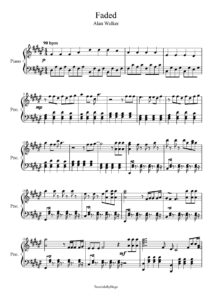 |
|
| Alan-Menken – Enchanted (Disney) |
 |
Enchanted Piano Vocal Guitar |
| Alanis Morisette – Hand In My Pocket | ||
| Alanis Morisette – Hands Clean | ||
| Alanis Morisette – Ironic | ||
| Alanis Morisette – Thank You | ||
| Alanis Morisette – That I Would Be Good | ||
| Alanis Morisette – Uninvited | ||
| Alanis Morisette – You Oughta Know | ||
| Alanis Morrissete You Oughta Know Sheet Music |
 |
|
| Alban Berg – Schliesse Mir Die Augen Beide (Musescore File).mscz | ||
| Alban Berg – Schliesse mir die Augen beide (Piano and voice Noten) |
 |
|
| Albeniz Isaac – Tango In D – Para Piano | Albeniz, Isaac – Tango In D – Para Piano | |
| Albeniz For Acoustic Guitar with Audio MP3 by Laurindo Almeida |
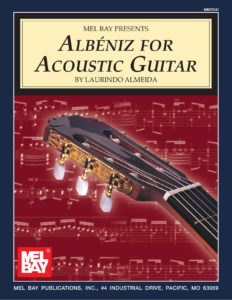 |
Albeniz for acoustic guitar with audio MP3 |
| Albeniz Suite Española V (Musescore File).mscz | ||
| Albéniz, Isaac – Capricho Catalán (Op. 165 no. 5) (Guitarra – Guitar) |
 |
|
| Albéniz, Isaac – Capricho Catalán (Op. 165 no. 5) (Piano) |
 |
|
| Albert Ammons 5 Boogie Woogie Piano Solos Sheet Music |
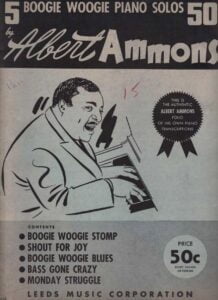 |
Albert Ammons 5 Boogie Woogie Piano Solos Sheet Music |
| Albert Ammons – Boogie Woogie Stomp |
 |
|
| Albert Ammons – Monday Struggle | Albert Ammons – Monday Struggle | |
| Albert Ammons – Shout For Joy | Albert Ammons – Shout For Joy | |
| Albert Ammons – Swanee River Boogie Woogie |
 |
|
| Albert Harris Sonatina Guitar Solo |
 |
|
| Albert Harris Variations And Fugue On A Theme Of Haendel (Guitar) |
 |
|
| Albert King The Very Best Of Albert King (Guitar TABs) |
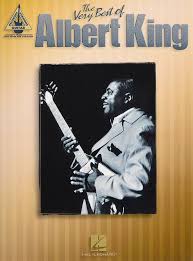 |
Albert King The Very Best Of Albert King |
| Albert Lee – The Best Of Albert Lee Guitar Tabs |
 |
Albert Lee – The Best Of Albert Lee Guitar Tabs |
| Albinoni – Adagio (Piano Solo Version) |
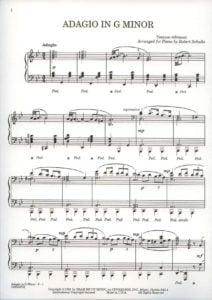 |
|
| ALBINONI-Adagio |
 |
|
| Album of Russian piano music | Russian music 1 | Russian music 2 |
| Album Of Scandinavian Piano Music By Louis Oesterle Vol. 1 (25 Pieces) 1902 |
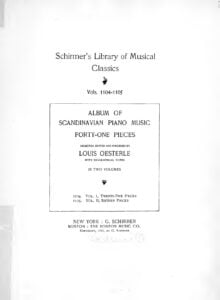 |
Album Of Scandinavian Piano Music By Louis Oesterle Vol. 1 (25 Pieces) 1902 |
| Alegre Magín – Americana (Guitarra) Habanera (Musescore File).mscz | ||
| Alegria Cirque Du Soleil Piano Vocal Guitar Chords Sheet Music |
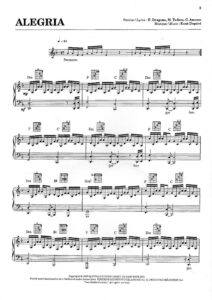 |
|
| Alejandro Sanz – Amiga Mia | ||
| Alejandro Sanz – La Margarita Dijo No | ||
| Alejandro Sanz – Y Si Fuera Ella | ||
| Aleksander Vertinskiy songbook |
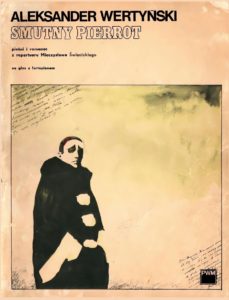 |
Aleksander Vertinskiy songbook |
| Alex North – Spartacus Love Theme (piano sheet music) |
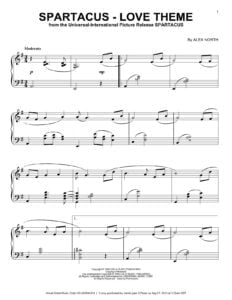 |
Alex North Spartacus Love Theme |
| Alex North Spartacus Love Theme (Lead sheet) | Alex Norrth SpArtacus | |
| Alexander Scriabin 24 Preludes Op. 11 1 To 12 Musescore File.mscz | ||
| Alexandra Streliski Burnout Fugue |
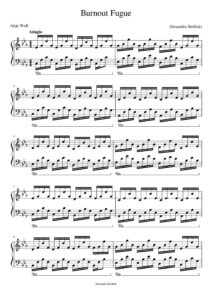 |
|
| Alexandra Streliski Le Noveau Dèpart |
 |
|
| Alexandra Streliski Par La Fenêtre De Théo |
 |
|
| Alexandra Streliski Plus Tôt |
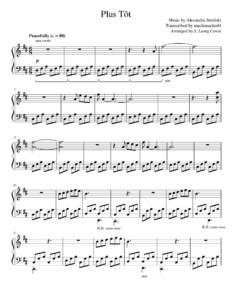 |
|
| Alexandra Strevisky Pianoscope |
 |
Alexandra Strevisky Pianoscope |
| Alexandre Desplat Elisas Theme Piano from The shape of water |
 |
|
| Alexandre Desplat The Shape Of Water Main Theme |
 |
|
| Alexandre Desplat – Lust Caution |
 |
Alexandre Desplat – Lust Caution |
| Alexandre Desplat – The Imitation Game |
 |
|
| Alexandre Desplat – The Meadow New Moon Piano solo Sheet Music |
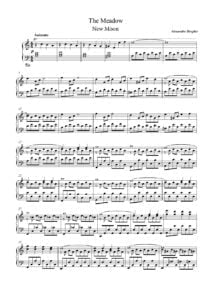 |
|
| Alexandre Desplat Almost A Kiss (From The Film New Moon) |
 |
|
| Alexandre Desplat and Lang Lang Kitty,s Theme from The Painted Veil | Alexandre Desplat and Lang Lang Kitty,s Theme from The Painted Veil | |
| Alexandre Desplat Brunos Theme From Suite Fran?aise |
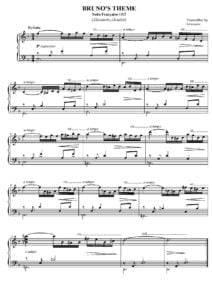 |
|
| Alexandre Desplat Full Moon (From The Film New Moon) |
 |
|
| Alexandre Desplat My Week With Marilyn – Marilyn’s Theme |
 |
|
| Alexandre Desplat Ost Godzilla Main Theme |
 |
|
| Alexandre Desplat The Danish Girl Theme Piano Solo |
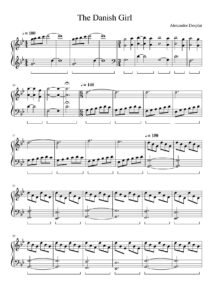 |
|
| Alexandre Desplat The Imitation Game |
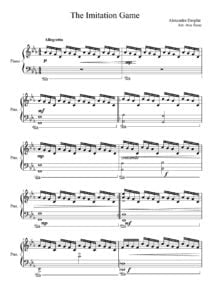 |
|
| Alexandre Desplat The King Speech |
 |
Alexandre Desplat The King Speech |
| Alexandre Desplat The Power Plant from Godzilla |
 |
|
| Alexandre Desplat The Wonder Of Life |
 |
|
| Alexandrov Piano Works Vol I |
 |
|
| Alexandrov Works for Piano Vol II |
 |
|
| Alexandrov Works for Piano Vol III Sonatas |
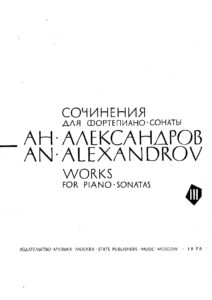 |
|
| Alexandrov, Anatoly 6 Preludes For Piano Op. 1 (1961) |
 |
|
| Alexis Ffrench – Bluebird |
 |
|
| Alfred Basic Adult Christmas Book Level 1 |
 |
|
| Alfred Basic Repertoire Level 4 |
 |
|
| Alfred Brendel A Pianists A-Z A Piano Lovers Reader Book |
 Andrew Hill 21 Piano Compositions Andrew Hill 21 Piano Compositions |
|
| Alfred’s Basic Adult Piano Course Level 1 |
 |
Lessons Alfred’s Basic Adult Piano Course Level 1 |
| Alfred’s Basic Adult Piano Course Level 2 |
 |
Lessons Alfred’s Basic Adult Piano Course Level 2 |
| Alfred’s Basic Adult Piano Course Level 3 |
 |
Lessons Alfred’s Basic Adult Piano Course Level 3 |
| Alfred’s Basic Piano Level 2B |
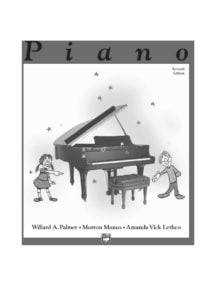 |
|
| Alfred’s Basic Piano Level 4 Jazz Rock Course |
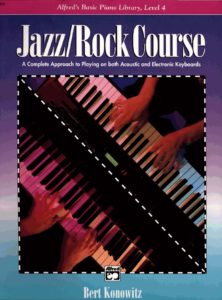 |
|
| Alfred’s Basic Piano Library Essentials Of Jazz Theory Book 2 |
 |
Alfred’s Basic Piano Library Essentials Of Jazz Theory Book 2 |
| Alfred’s Basic Piano Library – Solo Book Complete Levels 2 & 3 for the later beginner |
 |
Alfred’s Basic Piano Library – Solo Book Complete Levels 2 & 3 for the later beginner |
| Alfred’s Basic Piano Library – Top Hits! Solo Book – Level 4 |
 |
|
| Alfred’s Basic Piano Library Essentials Of Jazz Theory Book 1 |
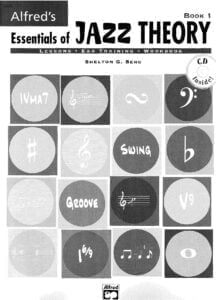 |
Alfred’s Basic Piano Library Essentials Of Jazz Theory Book 1 |
| Alfred’s Basic Piano Library Essentials Of Jazz Theory Book 3 |
 |
Alfred’s Basic Piano Library Essentials Of Jazz Theory Book 3 |
| Alfred’s Basic Piano Library Lesson Book Level 3 |
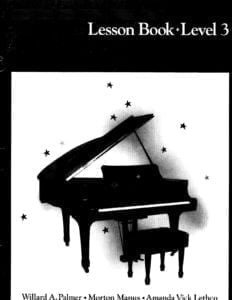 |
|
| Alfred’s Teach Yourself To Play Guitar Everything You Need To Know To Start Playing The Guitar! (with Tablature) |
 |
|
| Alfred’s Essentials Of Music Theory, Complete (Andrew Surmani, Karen Farnum Surmani Etc.) Sheet Music |
 |
|
| Ali and Nino (Dario Marianelli) | ||
| Alice Coltrane Monument Eternal (book) The Music of – by Franya J. Berkman |
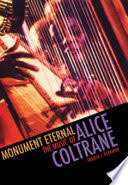 |
|
| Alice In Chains Dirt Full album Guitar TAB with lyrics |
 |
Alice In Chains Dirt Full album Guitar TAB with lyrics |
| Alicia Keys – A Woman’s Worth | Alicia Keys – A Woman’s Worth | |
| Alicia Keys – A Womans Worth | ||
| Alicia Keys – And I | ||
| Alicia Keys – As I Am (Songbook) |
 |
ALICIA KEYS SONGBOOK |
| Alicia Keys – Butterflyz | ||
| Alicia Keys – Diary | ||
| Alicia Keys – Fallin | ||
| Alicia Keys – Fallin’ (Sheet Music – Piano) | Alicia Keys – Fallin’ (Sheet Music – Piano) | |
| Alicia Keys – Goodbye | ||
| Alicia Keys – How Come You Dont Call Me | ||
| Alicia Keys – If I Aint Got You |
 |
|
| Alicia Keys – Impossible | ||
| Alicia Keys – Never Felt This Way | ||
| Alicia Keys Diary Song Book |
 |
ALICIA KEYS DIARY SONGBOOK |
| Alicia Keys The Element Of Freedom Songbook |
 |
ALICIA KEYS |
| Alicia Keys Unplugged |
 |
ALICIA KEYS UNPLUGGED |
| Alkan, Charles Valentin Concerto For Solo Piano 1st Movement Opus 39 No. 8 In G Minor (Piano Solo Reduction) |
 |
|
| All 4 One – I Can Love You Like That | ||
| All 4 One – I Swear | ||
| All American Folk Complete Sheet Music Editions Volume One (Creative Concepts Publishing Corp.) |
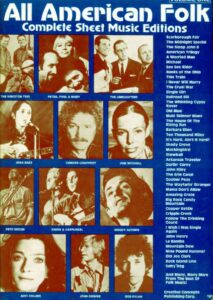 |
All American Folk Complete Sheet Music Editions Volume One (Creative Concepts Publishing Corp.) ( |
| All Blues For Jazz Guitar Comping Styles Chords And Grooves by Jim Ferguson Guitar Tablature |
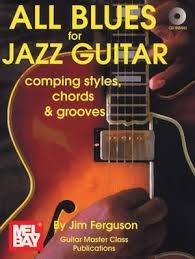 |
All Blues For Jazz Guitar Comping Styles Chords And Grooves by Jim Ferguson Guitar Tablature |
| All Blues Soloing For Jazz Guitar – Jim Gerguson Play Along (Book + audio MP3) with Tablature |
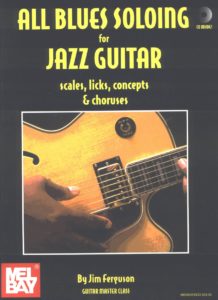 |
All Blues Soloing jazz guitar |
| All By Myself – Celine Dion (Musescore File).mscz | ||
| All I Want For Christmas Is You (Musescore File).mscz | ||
| All Of Me – Jazz Standard Stride Piano arr. Gerald Marks and Seymour Simons | All of me (Gerald Marks and Seymour Simons) Jazz Piano Solo arr. sheet music | |
| All Of Me – Jazz Standard Stride Piano Arr. Gerald Marks And Seymour Simons (Musescore File).mscz | ||
| All Of Me Fingerstyle Guitar TABs By Lucas Brar Jazz Standard (Gerald Marks and Seymour Simons) | All Of Me Fingerstyle Guitar TABs By Lucas Brar Jazz Standard | |
| All Of Me Gerald Marks & Seymour Simons 1931 Jazz Standard (Vintage sheet music) | All Of Me Gerald Marks & Seymour Simons 1931 Jazz Standard (Vintage sheet music) | |
| All Of The Jazz Standard Vol. 1 |
 |
All Of The Jazz Standard Vol. 1 |
| All Of The Jazz Standard Vol. 2 |
 |
All Of The Jazz Standard Vol. 2 |
| All Saints – Never Ever | ||
| All Sondheim Vol I Music and lyrics |
 |
All Sondheim Vol I Music and lyrics |
| All Sondheim Vol II Music and lyrics |
 |
All Sondheim Vol II Music and lyrics |
| All Sondheim Vol III Music and lyrics |
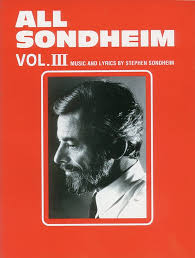 |
All Sondheim Vol III Music and lyrics |
